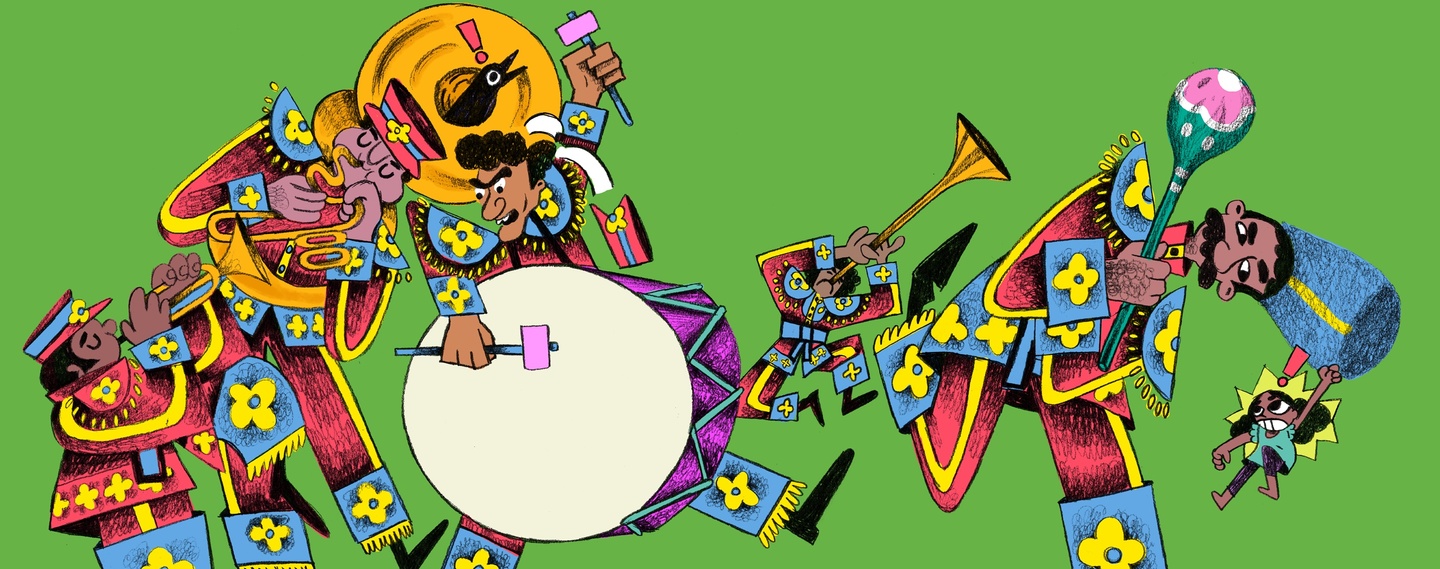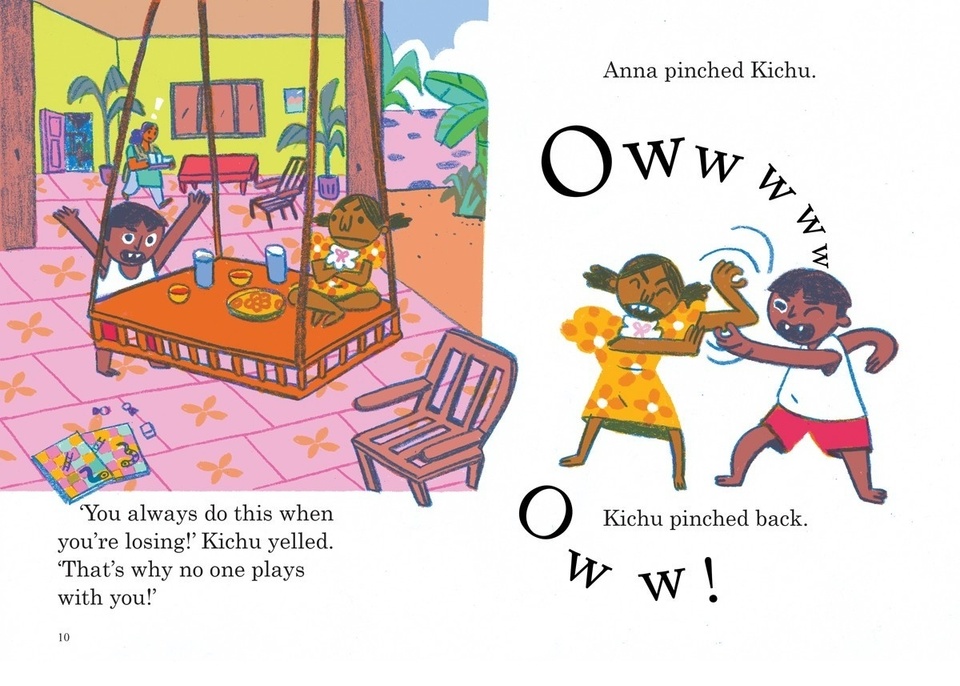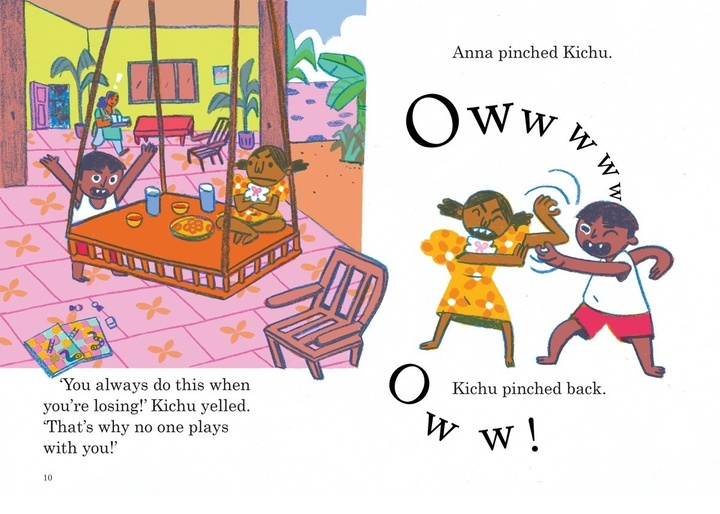Kruttika Susarla, MFA-IVC '22
Kruttika Susarla graduated from the MFA in Illustration & Visual Culture (MFA-IVC) program in 2022. Since then, she’s built a freelance career illustrating for outlets like The New Yorker and Penguin Random House India, participating in residencies, and attending conferences like the St. Louis Independent Comics Expo and MoCCA Fest. Based in Rochester, N.Y., Susarla is currently working on her first author-illustrator picture book, which she calls a “silly and goofy story for kids eight and under.”
You graduated from the MFA-IVC program in 2022. What sticks out about the program to you now that you’re on the other side?
Two things stood out to me that I keep thinking about after having graduated from the program. The first is the historical context. One of the things that drew me most to the program was its focus on illustration in regard to its social and historical context across time. While American visual culture and print history aren’t my focus, seeing the lineage of these objects, who made them and how they came into being, gave me a way of looking at and considering mass media that I could then apply to the history of images in my home country, India. It gave me a better understanding of the correlations between image-making and systems of power.
The second thing that stood out to me with this program is its focus on authorship. In Drawing and Voice, a class taught by Daniel Zettwoch, I had the opportunity to create in a wide variety of ways. I created adaptations and original stories, both long pieces and short, and I found that I found my voice and the kinds of narratives I wanted to tell from that class. After graduating, this has been immensely helpful as I continue to experiment and play within my professional work.

Pratham Books | The Freedom Sisters, 2024
What’s surprised you about your creative trajectory?
Before coming to the program, I worked as an illustrator and graphic designer, but specifically in a service role. My work consisted of responding to briefs from clients. I came to this program because I wanted to change that dynamic, become a better writer, and author my own works. During my time at WashU, I did a lot of writing. I took a creative writing class taught by Danielle Dutton where we played with ekphrasis and used images as prompts to write words, which was something new to me. Along the way, I fell in love with world-building and understood that so much of what is important to me as an author goes beyond the word-by-word construction of sentences and lives more in the world those sentences give a reader. As a cartoonist and children’s book illustrator, I feel much more confident in my ability to build those worlds both in the text itself and in the way that text lives alongside the images.
Where did your book idea originate?
In the IVC program, so much of my process revolved around letting pictures tell the story and that approach has been the same for my current book project. It started with this drawing of a girl who kept popping up in my sketchbook and who, later down the line, manifested herself surrounded by birds and giant vegetables in a poster I made last year. When my agent saw the image, he had so many questions about it. Why was this kid in this forest? Why were the plants larger than life? Why was it night? My idea for this book has been working backwards and trying to answer some of those questions. The work is still in its early stages as I’m still figuring out what some of those answers could be.
Are there any creative practices or routines that you find helpful?
Sketchbooking is a really important part of my process and helps keep me excited about drawing. What I love most about sketchbooking is that I can do it anywhere and it encourages me to draw a diverse range of subjects from people to animals as well as objects and places in a way that expands my visual vocabulary. I’ve noticed that when sketchbooking isn’t a regular part of my practice, I find myself stuck for ideas in both personal projects as well as in professional work.
What sort of themes do you find yourself working with?
When I was working on my thesis project at WashU, I thought a lot about themes I’m drawn to not just visually, but also conceptually. I realised that stories about groups of people doing things together were a consistent theme in my work. My thesis comic was about different communities that weren’t getting along with each other, but they figure out they had to work together for a better future. In another story, I have a character whose arc only changes when they work as a collective.
What’s on your illustration wish list?
There are so many different things I want to do as an illustrator. I have a list of picture books and comic ideas that I’m making my way through. I want to do book covers, I want to draw a lot more birds—working with the Audubon Society is on my wishlist! While I love working as an author-illustrator, I also really enjoy the work I do with community justice and rights organizations. I’ve worked with a lot of these groups in the global south and more recently in the US. It’s the kind of work that allows me to put into practice my politics and consider my own practice of image-making in relation to systems of power.
Book Cover: In That Mill, I Too was Forged 2023
Cover illustration and design for “In That Mill, I Too Was Forged” by people’s poet Narayan Surve, who was raised by the mill workers of Bombay and throughout his life, was actively involved in workers’ movements. Published by Speaking Tiger and art directed by Maithili Doshi. The book was translated from Marathi by Jerry Pinto.
The New Yorker: Pick 3 2024
Spot Illustration for The New Yorker’s Pick 3 Section featuring Vivek Shanbag’s book, Ghachar Ghochar. Published in the 15th Jan 2024 issue.
Privacy Supreme: Internet Freedom Foundation 2023
Poster and additional material for Internet Freedom Foundation’s event, ‘Privacy Supreme’. This yearly event marks the Puttuswamy judgment that guarantees privacy as a fundamental right in India.
Sketchbook
Sketchbook
Sketchbook
















